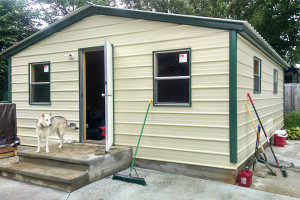
Turning Your Garage into a Business
Like so much else in our lives, the coronavirus pandemic is changing the very nature of work. Before the pandemic, only one-in-five Americans said they worked from home. By late spring 2020, growing sanctions mushroomed that number to more than 70 percent. Friendlier confines in turn boosted both moral and productivity. The change of venue and flexibility in scheduling became fringe benefits for overstressed workers looking to escape the drudgery of office life. Times of crisis have a way of accelerating change and progress. Ingenuity is commonly stimulated by difficulty. To keep the transmission of America’s powerful economic engine from slipping, millions of businesses loosened the reins and trusted their employees enough to continue to work from home. The results are undeniable. Similar economic incentives continue to unfold in the private sectors. Those wishing to strike out on their own have found success by exploring the merits of turning your garage into a business.
Steel Buildings Remove Barriers for Entering the Business World

Striking out on your own as a small business owner is a risky venture. First, you must develop a niche product or service that no one else is doing or can offer. After developing a solid business, aspiring entrepreneurs must secure a line of credit or cash flow to support a fledgling enterprise. Initial startup costs become powerful deterrents for upstart businesses looking to stand above the competition. A physical storefront or base of operations constitutes the bulk of the recurring overhead. Many hopeful business owners don’t make it past the loan officer’s heavy steel door before abandoning their dreams altogether. But the coronavirus pandemic soon changed the traditional brick-and-mortar approach of operating a small business. With lockdown orders and operating costs siphoning business’s profits – and by a larger extension the state’s tax base, governments nationwide begin to allow companies to open up shop from the comfort of their homes. Homes were soon allowed to sell food and new laws increased how much of a person’s home they could use to run a business. The socioeconomic effects were indicative of a true societal shift. People who could’ve only dreamed of opening a small business – women and people of color – now constituted a bulk of the new business owners nationwide. And as you might’ve guessed they’re doing quite well. With reduced overhead costs and operating expenses, they can focus on refining their craft or product without government intervention.
From Storefronts to Permanent Garage Sales

In Seattle, Washington, one couple didn’t let a pesky lockdown derail their their plans to open a cider and mercantile. With the pandemic dashing their dreams of opening a downtown storefront, their only recourse was to open up shop in their street facing garage. Their cooped up and bored neighbors quickly took note. One by one, thirsty customers, who yearned for some human interaction other than their children’s remote learning sessions, clamored to the bar for a welcomed break. The curbside water hole, unfortunately, drew the ire of some snoopy or jealous neighbors who reported the couple’s ingenuity to the city’s planning board and health department. But with the wheels of change already turning, the couple’s satisfied customers took a petition to city hall to change ordinances concerning where a business could operation. Municipalities nationwide followed as the downtown exodus continued.
Before the coronavirus changed commerce, the Internet catalyzed the stagnant 9-5 business model, which clearly wasn’t working. Business and transactions take place all hours of the day in every corner of the world. Concrete storefronts are no longer necessary for solid growth. With online sales continuing to contribute to the largest percentage of sales, we can anticipate more and more business shifting to remote operations. But space will always come at a premium. Residential homes were simply not made to accommodate a small business. Inventory alone will quickly eat into available floor space. Even the most clever configurations will see you budding home enterprise affecting your private life, further eroding the fine line between business and pleasure. The time has now come to consider turning your garage into a business.
Customizable Garages For At-Home Businesses

At a fraction of what it costs to build a new brick and mortar location, you can customize and design a steel metal garage for your onsite business. With our innovative online builder, you can set the dimensions, doors and windows of your next custom onsite business. Or if you’ve reached a creative block, click over to our online catalog for some fresh inspiration. Each of our buildings can engineered to accommodate any operation or need. By partnering with a local contractor, you can also outfit your metal building with electricity, insulation and plumbing.
Creative Ideas for Turning Your Garage Into a Business
- Coffee shops
- Bars and breweries
- Thrift stores
- Cafes
- Repair shops
- Barber shop
- Consulting and office space
- Web design



